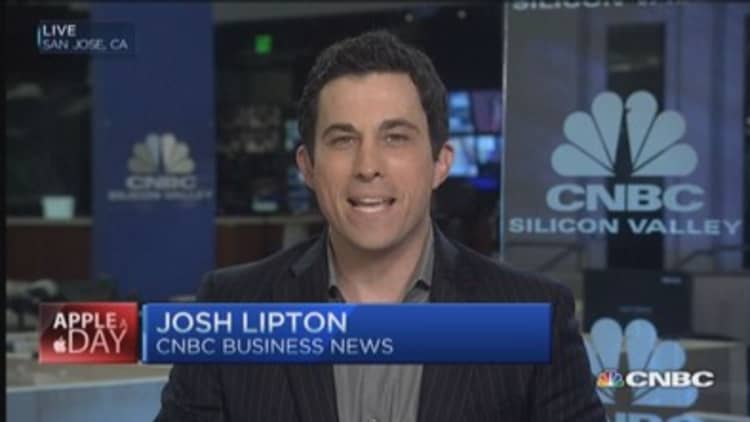Apple isn't afraid to become a trendsetter in new categories. Its latest breakthrough: The corporate bond market.
Last week the technology giant sold its first nondollar bonds, including a 1.4 billion euro 12-year issue with a 1.671 percent coupon, the lowest ever in that maturity for a corporate issuer. A few days later, technology and manufacturing company 3M Co. shattered that record with a 750 million euro 12-year bond with a 1.5 percent coupon. Drugstore chain Walgreen also sold a 12-year bond this week with a 2.125 percent coupon. Walgreen declined to comment. The other companies did not respond to requests for comment from CNBC.com.

Why are U.S. companies rushing to Europe? While companies with operations in Europe could have natural reasons to raise money there, there's another motivation that's purely financial. Yields on investment grade bonds denominated in euros are about 1.6 percentage points lower than similar bonds priced in dollars, according to data from Citigroup. That's the widest gap since 2006.
It's not just the lower coupon that makes euro deals attractive. It's possible to use derivatives called swaps to essentially convert the euro bonds back into dollar bonds. In some cases, U.S. companies wind up borrowing at a better rate without taking any currency risk, according to fixed-income professionals at Wall Street banks. The terms look most attractive on long-dated bonds, which may explain the high level of activity in 12-year bonds in recent days.
The current alignment of interest rates and swaps effectively creates an arbitrage opportunity. U.S. investment grade issuers have sold $37 billion worth of euro-denominated bonds so far this year, according to Dealogic. That's the highest level since at least 2000, Dealogic said.
Of course, not every U.S. company can tap the European debt market. Euro-denominated deals are likely to make sense for large, highly rated companies that have enough scale to manage international currencies and exchange rates. And if many companies pursue the same opportunity, the arbitrage opportunity could gradually fade as interest rates and exchange rates get squeezed.
Even so, there is probably still plenty of room for more U.S. companies to head to Europe. If they do, it could potentially cause a shortage of new U.S. dollar bonds available in the U.S. bond market.
So far this year, U.S. investment grade companies have sold $366 billion of dollar-denominated bonds, according to Dealogic. While that might appear to be a massive amount of supply, demand for high-quality corporate bonds may be even higher.
Just as corporate bond issues have reached record levels, yields have fallen to historic lows. That has led money managers to purchase bond substitutes such as securities backed by mortgages and auto loans, according to Brian Reynolds, chief market strategist at Rosenblatt Securities.
Read More Apple bull thinks stock's headed to $125 per share
Indeed, data suggest structured products are having a renaissance after falling from favor during the financial crisis. As of the end of the third quarter, there were $33.6 billion in securities outstanding backed by sub-prime auto loans, according to the Securities Industry and Financial Markets Association. That's the highest level since the peak of $33.9 billion at the end of 2006.
Another problem is that many investors are seeking very high returns on fixed-income portfolios. The vast majority of pensions, for instance, have targets of 7 percent to 8 percent a year, Reynolds said.
Risky securities may look even more attractive to investors if there's a shortage of high-quality corporate bonds. While yields are already at very low levels on U.S. corporate debt, they could slide even lower if companies put fewer bonds up for sale.
As companies such as Apple get more creative, so too will U.S. investors in search of decent returns.
Read MoreWhy investors will gobble up 1% Apple bonds
UPDATED: This story was updated to state that Walgreen declined to comment.

